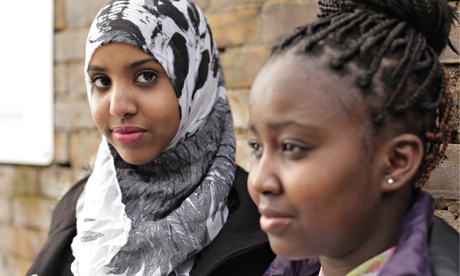
If you had told me a year ago that today I'd be meeting Michael Gove I'd have said: "Yeah, right." Come to that, if you'd said we were going to record a song, I would pinch myself, except I was there for the song and you can hear it and I have the letter from Gove and it's been in the news.
I wouldn't have believed that my face would be on the front page of a national newspaper. I wouldn't have believed that the incredible Malala Yousafzai and the secretary general of the UN would have supported my campaign, or that MPs such as Jane Ellison and Lynne Featherstone would want to meet me, or that the director of public prosecutions would seek my advice on ending female genital mutilation (FGM).
I certainly wouldn't have believed that 230,000 people so far would back the campaign and together we would make Michael Gove sit up and listen to us.
Today is a day for believing. Today we'll get an early train from Bristol, and this afternoon we'll sit across a desk from the education secretary, the man who has a power to break the wall of silence around FGM and end it, at least in this country, through education. It's been a long journey and I'm a small part of a campaign that is made up of fantastic organisations, large and small, and many individuals fighting this practice.
Thanks to tireless work from organisations such as Integrate Bristol – of which I am a young trustee – we've seen so much progress. Progress comes in lots of shapes and sizes. It was progress that I went to Integrate Bristol after school one day when I had no idea what FGM even was. It was progress when we organised a conference, started putting on plays about it and took the message to doctors and even boys (unheard of before Integrate Bristol). We've had lots of support and real political progress too – from the Departments of Health, International Development, and Communities and Local Government.
Malala's support is humbling and I can't begin to express how much it means to all of us. I think we all feel that Malala's campaign and ours are connected, they are both about empowering and liberating.
Now, as we head to London, it's time for some real progress from Michael Gove. If I had to name the three things that I would want to get out of the meeting with him, the first would be that he promises to write to all schools offering guidance for teachers on how to educate children about FGM in their schools.
I would like him to ask headteachers to train all staff about the risks of FGM and that he makes all schools teach children and young people about the risks of female genital mutilation in an age-appropriate manner before the summer holiday. He should do this because the risks are huge and they last a lifetime, and because the summer holiday is when young girls may be most at risk.
Teachers are smart people, they can teach this difficult issue sensitively and delicately – I should know, I've seen it happen. The quicker the message gets to schools, the quicker the cycle will be broken. In secondary schools teachers will talk to tomorrow's mothers, breaking the cycle that way. In primary schools teachers would have the confidence to take on this issue on the frontline.
Gove should write to them because of the hundreds of thousands who have backed our campaign and know it's the right thing to do, who agree that this horrific abuse must be stopped. It's important that schools in all areas get the message – teachers move and so do people. The FGM emergency needs to be tackled head-on, and tackled now.
For those who have survived FGM, it will mean so much. It will mean that he has understood, he has heard, and he understands that it is, simply, child abuse. I hope he'll want to be remembered as the person who broke the cycle of abuse, and stopped it.
Sign the petition at www.change.org

